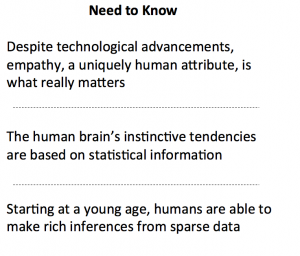Why your gray and white matter matters
November 10, 2015 ~ Written by: W.B. “Bud” Kirchner
 “To err is human, but to really foul things up you need a computer.” – Paul R. Ehrlich
“To err is human, but to really foul things up you need a computer.” – Paul R. Ehrlich
In our previous post titled “Are we as dumb as we think we are?” we looked at the work of MIT scientist Laura Schulz and others involving young children (around two years old). Their findings centered on two ideas:
- Generalization (assuming a subset is random)
- Causal Reasoning (why something works or doesn’t)
In other words, babies sense when a smaller set represents a larger population.
(Btw, in Schulz’ TED Talk titled “The surprisingly logical minds of babies” she has amazing video snippets of her research with toddlers)
To say this is the most fascinating research I have seen in a long time would be a complete understatement.
“A story about minds, not brains”
 In short, Schulz’s work illustrates the uniquely human ability to make “rich inference from sparse data.” Her observations include:
In short, Schulz’s work illustrates the uniquely human ability to make “rich inference from sparse data.” Her observations include:
- Babies did exactly different things based only on the probability they observed.
- Change to a less improbable sample and the babies changed their reaction.
Her work also illustrates:
- We learn so much – from so little – so quickly.
- Our instinctive tendencies are based on statistical information.
- A toddler can’t speak, but can use statistical data to decide how to deal with the world.
- Our mind generalizes properties.
“The human brain works as a binary computer and can only analyze the exact information-based zeros and ones (or black and white). Our heart is more like a chemical computer that uses fuzzy logic to analyze information that can’t be easily defined in zeros and ones.” – Naveen Jain
As she waxes eloquently on the fascinating results she also reminds us that the human brain is uniquely suited to initiatives such as: sensing what others are thinking, dealing with confounded evidence, causal relationships, making tools and vocabulary.
Silicon vs. Carbon II
“A computer would deserve to be called intelligent if it could deceive a human into believing that it was human.” – Alan Turing
Out of fairness, Schulz does touch on the area where computers have the advantage – in particular, dealing with ‘big data’ and of course, the looming machine learning.
Nevertheless her work does encourage me to revisit one of our earliest posts titled “Is Hyper-Connectivity Making us More Disconnected?” In that piece I delve into the battle of silicon (digital) vs. carbon (people). And like all good battles (think Ali-Frazier or the early Rocky movies), there is a Round Two.
With that in mind, it looks like a classic slugfest between silicon and carbon until Schulz reminds us at the end of her TED Talk about the amazing capacities of the human brain in areas such as creative ideas, research, discovery, art, literature and music.
“Never trust a computer you can’t throw out a window.” – Steve Wozniak
So now, silicon is on the ropes when she comments, “In the years to come we are going to see technological innovations beyond anything I can even envision. But we are very unlikely to see anything even approximating the computational power of a human child in my lifetime or in yours.”
However, the knockout punch comes when she reminds us about the ultimate uniquely human attribute: Schulz touches on what really matters (and a topic included in several of my writings) empathy.
Again, (especially given her credentials) I will give final word to her.
“Human minds take care of other humans. Our old, our young, our sick. We even heal them.”
Yes we do.
So what do you think? Have I convinced you carbon is better than silicon? Do you believe the brain is a supercomputer that starts programming before we can talk? I’d love to hear what’s going on in your brain.
About the Author: W.B. “Bud” Kirchner is a serial entrepreneur and philanthropist with more than 50 years of business success. He is not a scientist or an academic but he does have a diversified exposure to neuroscience, psychology and related cognitive sciences. Generally speaking, the ideas he expresses here are business-angled expansions of other people’s ideas, so when possible, he will link to the original reference.
